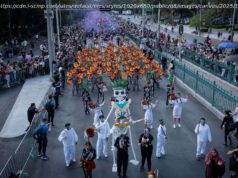Natalia Veselnitskaya represented Russia’s top spy agency in a land dispute in Moscow, according to court documents.
The Russian lawyer who met with Donald Trump ‘s eldest son and other senior campaign advisers in a highly scrutinized meeting at Trump Tower last year had previously represented Russia’s top spy agency in a land dispute in Moscow, according to court documents.
Natalia Veselnitskaya, a Moscow lawyer with powerful government contacts, represented a military unit founded by the Federal Security Service in court cases in 2011 and 2012, court rulings seen by The Washington Post show.
In those cases, Veselnitskaya represented Military Unit 55002 in a dispute over a five-story office building in northwest Moscow where a number of electronics companies were based. It was not immediately clear what the spy agency, known as the FSB, used the building for. But the state-run company that now occupies the property provides electronic components for Russian tech companies.
The news was first reported on Friday by Reuters, which said it had seen documents showing Veselnitskaya’s role in the legal tussle began as early as 2005 and lasted until 2013.
According to legal records, Military Unit 55002 was founded by the FSB, and it is located next to the Lubyanka, the headquarters of the Soviet Union’s secret police and intelligence agency for decades. The military unit works on procurement for the FSB, which directs Russia’s counterintelligence and border security agencies.
Russian lawyer Natalia Veselnitskaya speaks during an interview in Moscow on November 8,2016.
There is no information suggesting that Veselnitskaya is herself an intelligence agent or an employee of the Russian government. But the new information adds to the intrigue surrounding the June 2016 encounter, in which Donald Trump Jr. met with what he was told was a « Russian government attorney » who could offer damaging information about Democratic presidential candidate Hillary Clinton .
U. S. intelligence agencies have concluded that Russian President Vladimir Putin ordered a campaign of cyberattacks and propaganda aimed at undermining the American presidential election and discrediting Clinton. A special counsel is investigating possible coordination between Trump’s associates and Russian officials during the campaign. President Trump has denied that his campaign received assistance from Russia.
The Russian lawyer who met with President Donald Trump ‘s eldest son during the 2016 election campaign said she’s ready to testify before the U. S. Senate and « clarify the situation behind this mass hysteria. »
Donald Trump Jr. agreed to meet with Natalia Veselnitskaya in the expectation of receiving…
The Russian lawyer who met with President Donald Trump ‘s eldest son during the 2016 election campaign said she’s ready to testify before the U. S. Senate and « clarify the situation behind this mass hysteria. »
Donald Trump Jr. agreed to meet with Natalia Veselnitskaya in the expectation of receiving…
Veselnitskaya could not immediately be reached for comment on Friday.
The court rulings are the first legal evidence to emerge of a relationship between Veselnitskaya and the Russian intelligence establishment. Rinat Akhmetshin, a Russian-American lobbyist who accompanied her to the meeting at Trump Tower, has also reportedly told friends that he was a former counterintelligence officer. He has told journalists that is untrue.
Veselnitskaya, a former Moscow regional prosecutor from 1999 until 2001, became well-known for defending developers in property disputes. She was married to a former deputy prosecutor for the Moscow region, and she represented the family of former Moscow region transportation minister Pyotr Katsyv.
She has said that she is in regular contact with Yuri Chaika, who has been the Russian prosecutor general since 2006. In emails that Trump Jr. received setting up the meeting, he was told that the negative information about Clinton originated with a top Russian prosecutor and was « part of Russia and its government’s support for Mr. Trump. »
Chaika’s office has denied supplying such information.
The lawsuit that came to light Friday was filed by the Federal Property Management Agency, which had given the FSB-run military unit the right to use the commercial property in 2007. The property agency was suing a private firm called Module B that claimed rights to the building. The military unit represented by Veselnitskaya was a third party in the lawsuit and « supported the demands of the claimant » – the federal property agency – the 2011 ruling read. The court ruled in favor of the property agency in 2013.
The five-story office building has served as a hub for state-run tech development since the era of the Soviet Union. According to the court documents, the building was used by the Soviet Ministry of Electronic Industry until 1991, when it was put on the market as part of a sweeping privatization of state assets, and then resold in 2000. A Russian appeals court in 2011 ruled that the original sale was illegal, saying the building had been « taken from government control against the will » of authorities.
A company called Electronintorg, which is owned by the state-run corporation Rostec, now says that it occupies the building. Rostec’s chief executive is Sergey Chemezov, a former KGB employee who served in East Germany alongside Putin.
A description on the company’s website says it « fulfills the requirements of industries of the Russian Federation for domestic and imported electronic components, technologies, » and is also involved in promoting Russian electronic products abroad.
Procurement records show that Elektronintorg has filled a little under 3.4 million rubles ($57,435) in government orders since 2015. Mainly, the orders are for niche industrial chemicals and supplies, such as photoresist, water glass and ion-exchange resin.
Some of the chemicals are used to create ultrapure water, which is commonly used in the semiconductor industry.
Home
United States
USA — Criminal Lawyer who met with Trump Jr. had Russian intelligence connections






